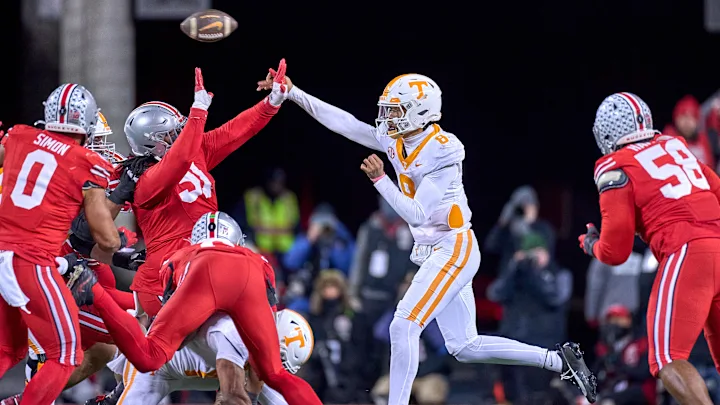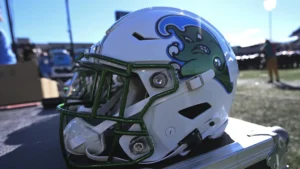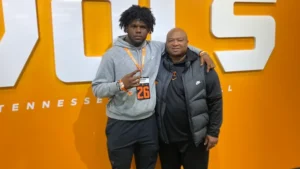
Iamaleava and other Tennessee players were threatened to miss the playoff game over NIL.
The rise of NIL (Name, Image, and Likeness) rights in college sports has introduced a wave of opportunities, but also a complex web of challenges for athletes, schools, and regulators alike. As NIL deals have become an increasingly significant factor in recruitment, retention, and overall team dynamics, they’ve also sparked controversy, especially when high-profile players like Tennessee’s Nico Iamaleava become involved. Recent reports have revealed a tense situation in which several Tennessee players, including the highly-touted freshman quarterback Iamaleava, were threatened with missing a crucial playoff game due to NIL disputes.
The Importance of NIL in Modern College Sports
NIL rights were officially granted to college athletes in 2021, allowing them to profit off their name, image, and likeness for the first time in NCAA history. For many athletes, this has been a groundbreaking change, particularly in high-revenue sports like football and basketball. The ability to sign lucrative endorsement deals, enter partnerships with brands, and monetize their social media presence has transformed the financial landscape for college athletes.
However, the implementation of NIL rights has not been without complications. While athletes can now legally sign deals with companies, colleges are prohibited from directly facilitating or brokering these deals. This lack of regulation and oversight has led to a fragmented system in which players, boosters, schools, and agents often find themselves at odds, creating tension that threatens the fabric of collegiate athletics.
In Tennessee’s case, the NIL issue reached a boiling point just as the Vols were preparing for a pivotal playoff game. The controversy centered around how deals were structured for key players, including Iamaleava, who was already becoming one of the most sought-after quarterbacks in the country.
Nico Iamaleava’s Role in the Drama
Nico Iamaleava, a five-star recruit and one of the highest-rated quarterbacks in recent memory, had already made waves when he committed to Tennessee. His commitment was largely seen as a game-changer for the Vols, as the program had been working to establish itself as a legitimate contender in the SEC after years of underperformance.
Iamaleava’s NIL value was skyrocketing even before he stepped onto the field for his first game as a Tennessee Volunteer. His combination of size, athleticism, and potential had made him a prime target for endorsement deals with major brands, making him one of the first college athletes to generate significant NIL revenue right out of the gate.
However, this newfound fame and financial windfall came with challenges. Reports surfaced that several Tennessee players, including Iamaleava, were threatened with missing the playoff game due to their NIL deals. The dispute centered around the conflicting interests of players’ personal agents, the school’s compliance department, and the boosters who were helping fund the NIL deals. The tension became so high that the university was forced to intervene in order to prevent any players from being sidelined during one of the most important games of the season.
NIL Deals: A Double-Edged Sword for College Programs
NIL deals have been seen as a double-edged sword for college programs. On the one hand, they allow programs to attract top-tier talent by offering opportunities for financial gain. On the other hand, they create a level of financial inequality that can lead to internal power struggles within programs. In Tennessee’s case, the players’ NIL deals had become a point of contention, as some felt they were being used as bargaining chips by external parties, while others felt that the university was not doing enough to protect its players’ interests.
The threat of missing a playoff game came after some of the players’ NIL deals reportedly violated NCAA guidelines, or at least appeared to be at odds with the spirit of the rules. As tensions rose, it became clear that Tennessee was facing a situation where the stakes were much higher than a simple recruitment battle or regular-season game—this was about maintaining compliance and managing potentially volatile situations with NIL deals that had rapidly evolved beyond the university’s control.
Boosters, Agents, and the Tennessee Power Struggle
At the heart of the issue was the involvement of Tennessee’s boosters, who played a significant role in securing NIL deals for the team’s star players. While the boosters’ financial contributions helped elevate the program, they also created a murky situation that blurred the lines between what was permissible and what wasn’t.
Tennessee’s athletic compliance department was forced to step in and work with the boosters, players, and their respective agents to resolve the issue. The goal was to ensure that no players, including Iamaleava, would miss any time during the playoff game due to NIL disputes. Yet, despite the efforts to smooth over the situation, the drama revealed the ongoing struggles many college programs face as they navigate the rapidly changing NIL landscape.
Some players’ NIL contracts were reportedly structured in such a way that they were contingent on certain performance metrics, endorsements, or appearances, which complicated the situation. In some cases, deals were set up in a way that made them appear to be impermissible pay-for-play arrangements, violating NCAA guidelines that prohibited direct compensation for athletic performance.
The involvement of third-party agents and financial advisors further complicated matters, as many of these individuals acted in their own interests, often without clear communication with the university’s compliance staff. The friction between external parties and the university’s internal policies was evident, and the result was an environment of uncertainty and potential penalties.
Tennessee’s Compliance Efforts
Tennessee’s compliance department faced significant pressure to resolve the issue. With the threat of players missing a playoff game hanging over the team, the athletic department worked to mediate between the players, boosters, agents, and university officials. At the same time, the university sought to remain in good standing with the NCAA, which was increasingly looking to clamp down on potential violations of NIL regulations.
In response, Tennessee implemented a series of measures to ensure that players’ NIL deals adhered to NCAA guidelines. These measures included closer oversight of contracts and negotiations, along with stricter compliance protocols to prevent future conflicts from arising.
Despite these efforts, the ongoing tensions surrounding NIL deals at Tennessee serve as a microcosm of the broader challenges facing college football. As players like Iamaleava continue to rise to prominence, the pressure to manage their financial interests—while adhering to NCAA rules—becomes increasingly difficult. The risk of violations and disputes only grows as NIL becomes more ingrained in college athletics.
The Bigger Picture: NIL’s Impact on College Athletics
The situation at Tennessee underscores the ongoing struggle to regulate NIL in a fair and consistent manner. While some players have benefitted immensely from their NIL deals, others have found themselves caught in the crossfire of complicated contract negotiations and conflicting interests.
For college football programs, NIL presents both a tremendous opportunity and a significant challenge. On the one hand, NIL deals offer a chance to compete for top-tier talent and keep players happy with lucrative deals that reflect their worth. On the other hand, these deals create an environment where athletes’ financial interests often take precedence over team goals, leading to potential conflicts of interest and complicating the relationship between players, coaches, and administrators.
As the NIL landscape continues to evolve, it will be interesting to see how college football programs like Tennessee navigate these challenges. The Iamaleava situation, in particular, illustrates the growing pains many programs are experiencing as they adjust to this new reality. Moving forward, schools will need to find a balance between capitalizing on NIL opportunities and maintaining the integrity of their programs, all while ensuring that players are protected from legal and financial pitfalls.
What’s Next for NIL and College Sports?
As the situation with Iamaleava and other Tennessee players highlights, NIL is no longer a simple side story in college sports—it’s now a central issue that can directly impact a team’s chances in big games. The battle over NIL deals is only just beginning, and the outcome will likely shape the future of college athletics for years to come.
For Tennessee, resolving the situation without losing players for a key playoff game was a significant win. But the broader lesson is clear: NIL rights, while offering new opportunities for athletes, also bring a host of challenges that must be carefully managed. The future of college football—and college sports in general—depends on how schools, players, and governing bodies navigate the evolving world of NIL.





